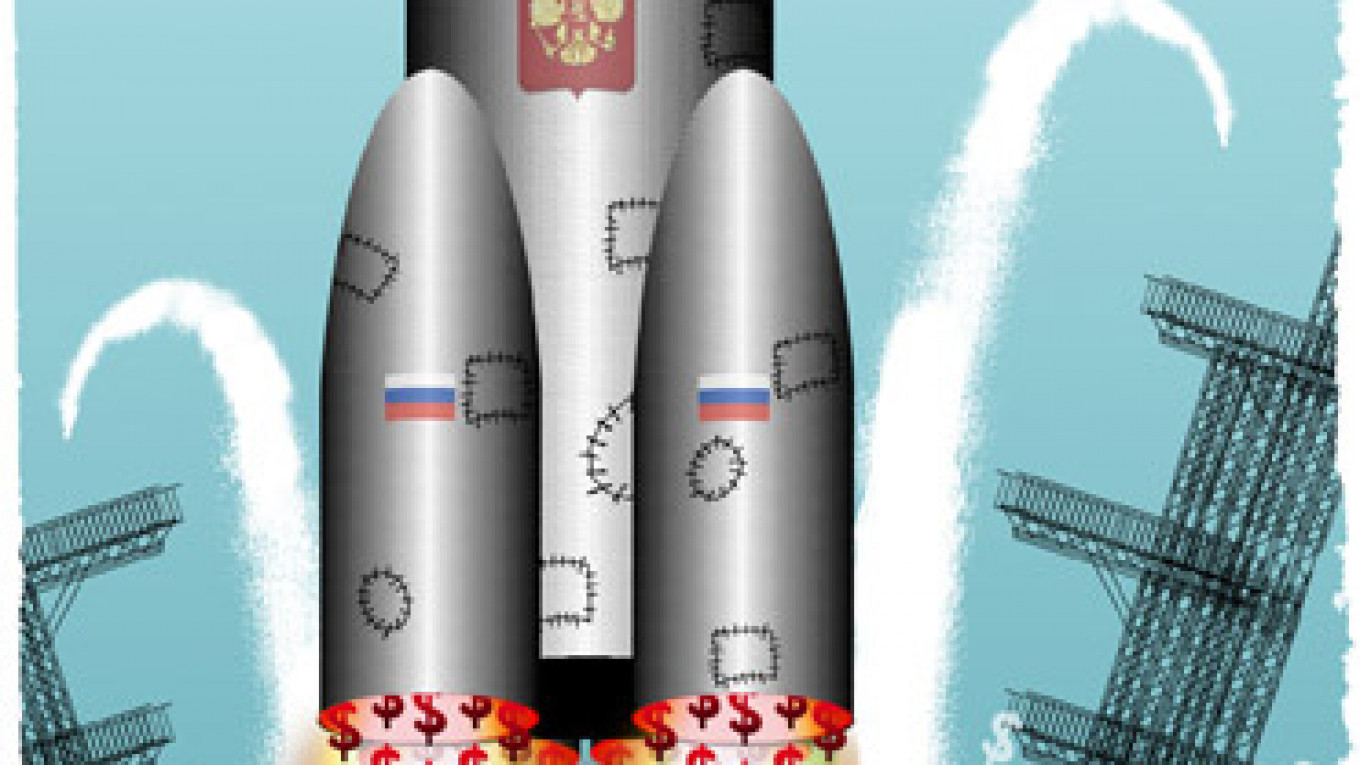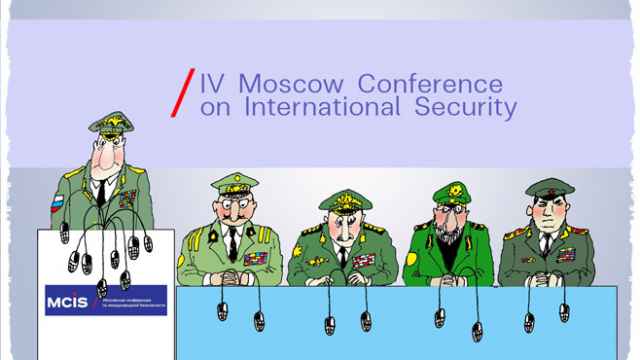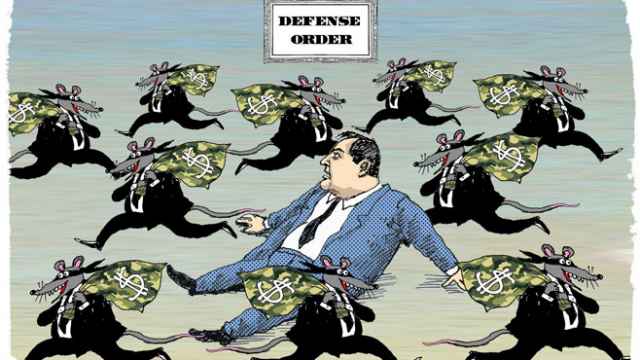I never cease to be amazed at how full life is of symbolic coincidences. On the very day that President Vladimir Putin submitted a bill to the State Duma calling for expanding the Federal Space Agency, or Roscosmos, the unmanned Progress cargo ship intended to resupply the International Space Station (ISS) failed to reach its proper orbit.
After it had problems deploying several antennae, the craft began spinning on its own axis. At that point, Russia's mission control lost communication with Progress and the cargo ship began descending. It is doomed to burn up as it reenters the dense atmosphere, and we can only hope that any falling debris will not pose a hazard to people back on Earth.
These unfortunate events serve as a sort of background to the authorities' efforts to create yet another huge corporation that will suck up government money like an enormous vacuum cleaner. This time, the bureaucratic behemoth is Russia's national space agency.
It has long been known that Russia has problems with its space program. Either an engineer with rusty counting skills overfills a rocket with fuel and sends it off into an indeterminate orbit or else a recent trade school graduate confuses the "positive" and "negative" leads on a rocket's sensors and causes the craft to fly directly back to its launch point.
Russia continues losing one satellite after another and brings nuclear missiles into service even as the number of failed test launches rivals the number of successful attempts.
It would be wrong to conclude that Russia's space industry alone is besieged with such problems. In fact, it suffers from the same difficulties afflicting other segments of the military-industrial complex.
The first and foremost of these is the inability to establish complex industrial cooperation and parts manufacturing. Further hampering efforts is the decline in skill level among workers, the aging of basic assets and the loss of even Soviet-era technology. After all, Progress rockets flew without a mishap for decades prior to the current troubles.
It is clear that the defense industry must undergo radical reforms to correct the host of problems that have been accumulating for decades. Rather than rely on the dozen or so military-industrial state corporations created in the middle of the last decade, leaders should base the industry on market principles.
At the same time, state officials should rein in their appetites and concentrate on a few priority projects rather than attempt to produce a full range of weapons. Of course, that remains only a remote possibility as long as Deputy Prime Minister Dmitry Rogozin and Defense Ministry brass continue to insist that the military-industrial complex serve as the main engine of growth for the Russian economy.
The problem is that the Russian authorities have only one response to these challenges — bureaucratic maneuvering. According to that logic, if the industry is facing a systemic crisis, a new director is required. That is why the Kremlin has replaced one space industry head after another, drawing on officials from the military-space forces responsible for missile launches.
They brought in space industry outsider Igor Komarov, former director of the AvtoVAZ automobile plant. However, that did not produce any discernible improvements. Finally, the authorities pulled the most powerful card from their well-worn deck of bureaucratic solutions and launched a large-scale reorganization.
The result will merge the United Rocket and Space Corporation — that includes space industry manufacturers — with Roscosmos. That will unite the state contractor with the agency placing the orders, essentially ruling out any possibility of external control.
The customer will always claim that the manufacturer produced exactly what was required, and both will blame all breakdowns, accidents and disasters on insufficient government funding.
There is also an ideological component in all of this. Officials at first rashly reported that the failed Progress cargo ship had been carrying a copy of the Soviet Banner of Victory and a set of St. George ribbons to the International Space Station.
Then they realized their error: with all of the hype surrounding the upcoming Victory Day celebrations, it would not be fitting if even a copy of the Banner of Victory — with its almost miraculous qualities — were to burn up in the atmosphere.
Accordingly, the space industry brass corrected its statement and announced that the Banner of Victory had long been aboard the ISS.
If that is true, it means that Russian officials consider it almost a heroic achievement for one of their rockets to reach the ISS, and have therefore loaded a Banner of Victory aboard every cargo ship just as every Soviet assault group deployed to storm the Reichstag building in Berlin in 1945 was issued its own Banner of Victory on the chance it actually achieved its objective and hoisted its flag above the building.
It turns out that endless bureaucratic perturbations and pseudo-patriotic blather are the only improvements the Kremlin can offer the military-industrial complex — that it funds to the tune of 2 trillion rubles ($40 billion) annually.
Due to conditions of secrecy, foibles and failures in other branches of the defense industry remain undisclosed — although reports sometimes leak out that the latest submarine docked for repairs has caught fire.
As a result, all the problems seem to be centered in the rocket industry. And the United States is to blame for that.
First, as a participant and supplier to the ISS, Russia must inform its "partners" of any planned launches.
Second, and more importantly, the North American Aerospace Defense Command, or NORAD, identifies and tracks all missile and rocket launches on the planet and can publicly report all of Russia's mishaps and failures.
That means there are two options for resolving Russia's rocket industry headaches: the realistic approach of putting the U.S. out of business, or the unrealistic approach of putting its own house in order.
Alexander Golts is deputy editor of the online newspaper Yezhednevny Zhurnal.
A Message from The Moscow Times:
Dear readers,
We are facing unprecedented challenges. Russia's Prosecutor General's Office has designated The Moscow Times as an "undesirable" organization, criminalizing our work and putting our staff at risk of prosecution. This follows our earlier unjust labeling as a "foreign agent."
These actions are direct attempts to silence independent journalism in Russia. The authorities claim our work "discredits the decisions of the Russian leadership." We see things differently: we strive to provide accurate, unbiased reporting on Russia.
We, the journalists of The Moscow Times, refuse to be silenced. But to continue our work, we need your help.
Your support, no matter how small, makes a world of difference. If you can, please support us monthly starting from just $2. It's quick to set up, and every contribution makes a significant impact.
By supporting The Moscow Times, you're defending open, independent journalism in the face of repression. Thank you for standing with us.
Remind me later.







